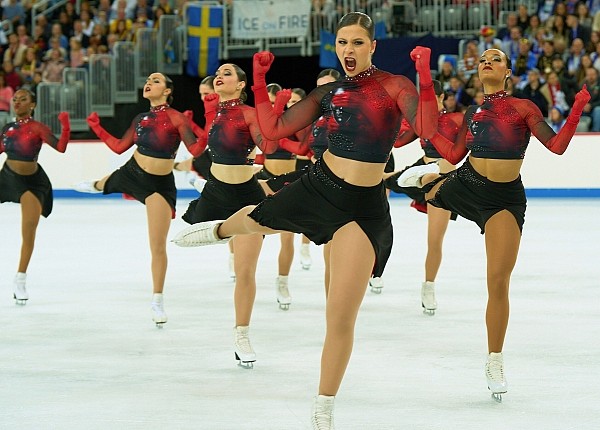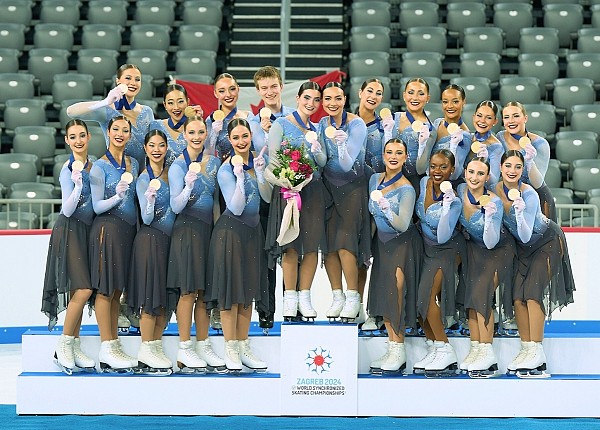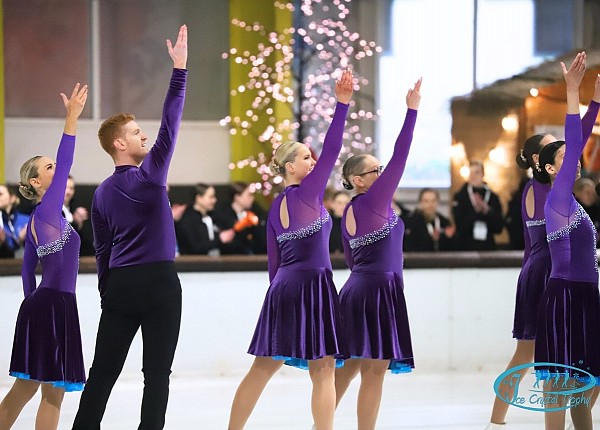Magazine
8 Helpful Tips To Know Before Skating Abroad
Magazine
8 Helpful Tips To Know Before Skating Abroad

Teammates' support is essential when a skater arrives in a foreign country. (Credits: Starlight by Ru-Pho - 2020)
Covid-19 has allowed us to take time for ourselves and refocus on our goals. For some, it certainly gave them the opportunity to dream bigger and the urge to dare the impossible. If your (new) dream is to go skating for a team that isn't in your country, here are some key points to help you and to succeed in your integration!
Last episode of our series on international skaters: the experience of a skater!
These tips were formulated by Agathe Merlier, a synchro skater who left France in 2013 to join Les Suprêmes Seniors in Montreal. She is also a correspondent for Jura Synchro in Canada.
These tips were formulated by Agathe Merlier, a synchro skater who left France in 2013 to join Les Suprêmes Seniors in Montreal. She is also a correspondent for Jura Synchro in Canada.

Going to skate for a foreign team isn't just about choosing a team that you like. It's about choosing coaches and a way of training that is right for us. Over the years, we develop a personality, and we all have preferences. This is what we should look for when choosing the team.
This is the most important for me. Without it, the adaptation will be really difficult and you will not fully benefit from this new experience that is opening up to you.
This is the most important for me. Without it, the adaptation will be really difficult and you will not fully benefit from this new experience that is opening up to you.

Agathe Merlier skates in Canada since 2013. (Credits: A. Merlier)
You have to take the time to ask yourself certain questions such as:
Am I able to live far from my family, or on the contrary, do I prefer to stay close? Where would I be most likely to adapt? What kind of personality am I looking for in my coach(es)? What type of skating skills do I like? What are the programs that I would have liked to skate? Which team would I be proud to represent?
These are just a few examples among many others, but we must take all the time necessary to think about it.
2. Don't be afraid of the languageAm I able to live far from my family, or on the contrary, do I prefer to stay close? Where would I be most likely to adapt? What kind of personality am I looking for in my coach(es)? What type of skating skills do I like? What are the programs that I would have liked to skate? Which team would I be proud to represent?
These are just a few examples among many others, but we must take all the time necessary to think about it.
The language barrier can sometimes be a handicap, but sign language is universal. We must not help to live our dreams because we don't speak the official language of the country or English. Having seen and experienced it, there is always a way to communicate and learn on the spot.
The language of skating is mainly looking, understanding and applying. However, we can use our blade guards or our hands to make ourselves understood. Communication is the first step towards creativity.
For example, I had a Japanese teammate, Sora, who spoke neither English nor French. She, therefore, had a computer when she arrived, which we used at each practice to translate the corrections or quite simply to get to know her!
The language of skating is mainly looking, understanding and applying. However, we can use our blade guards or our hands to make ourselves understood. Communication is the first step towards creativity.
For example, I had a Japanese teammate, Sora, who spoke neither English nor French. She, therefore, had a computer when she arrived, which we used at each practice to translate the corrections or quite simply to get to know her!
3. Communicate with your coaches
Once you've made your team choice, I think it's important to talk to your coach about it. He/she will be able to help you, advise you, and possibly put you in contact.

The last thing to know, and certainly the most important, is that there is an agreement between the federations.
To represent another country internationally, you must have requested a "release letter" from your home federation. This letter authorizes you to represent your new country. Without it, it's impossible to set foot on the ice in international competitions or your team will be disqualified.
In the worst case, if you don't get this letter, it'll normally be enough to wait a year without having represented a country in an international competition in order to be able to skate for your new team.
To represent another country internationally, you must have requested a "release letter" from your home federation. This letter authorizes you to represent your new country. Without it, it's impossible to set foot on the ice in international competitions or your team will be disqualified.
In the worst case, if you don't get this letter, it'll normally be enough to wait a year without having represented a country in an international competition in order to be able to skate for your new team.

5. Take the time to prepare
Although it's possible to leave overnight in a new team, the road to get there can be difficult at times. Therefore, it's important to learn as much as possible about your future living environment and prepare for it.
Note that no question is stupid, and you shouldn't be afraid to ask for help.
Note that no question is stupid, and you shouldn't be afraid to ask for help.

For example, in some countries it may be necessary to obtain a study or work permit in order to be able to live but also to enter and leave the country without problems during competitions. The best way to get this information is to simply find out what agreements your country has with the country to which you wish to immigrate. In this case, the ideal would be to prepare for your departure at least 6 months in advance.
Take advantage of this great opportunity to create a great project for yourself: invest in your future, it's possible to reconcile studies/work and sport with organization and determination.
Last immigration point: Anticipate your steps to stay in the country before the end of your permit if you want to continue the adventure! This will prevent you from finding yourself in my situation: my team left without me for the Lumière Cup 2018 otherwise I couldn't come back to Canada. So I watched them in livestream and it's not the most fun experience to live!
6. Technology to keep in touchTake advantage of this great opportunity to create a great project for yourself: invest in your future, it's possible to reconcile studies/work and sport with organization and determination.
Last immigration point: Anticipate your steps to stay in the country before the end of your permit if you want to continue the adventure! This will prevent you from finding yourself in my situation: my team left without me for the Lumière Cup 2018 otherwise I couldn't come back to Canada. So I watched them in livestream and it's not the most fun experience to live!
Being away from family can be scary, but we're lucky to have technology with us. For example, I send them messages every day. Right now with Covid-19 and the border closings, I take the time to do Facetime with them every weekend.
These little moments allow me to better accept the situation and it's been 8 years since I left! Of course, there will be times that are more difficult than others, that's for sure, especially before the reunion and the excitement it generates. The wait will become unbearable but every time you see your family again, it is as if you had never left although life goes on on their side too.
However, the adventure you are going to live will be so rich in emotions that you will create a new family with your team. Thereafter, you will always feel divided between the two!
7. Accept the ups and downsThese little moments allow me to better accept the situation and it's been 8 years since I left! Of course, there will be times that are more difficult than others, that's for sure, especially before the reunion and the excitement it generates. The wait will become unbearable but every time you see your family again, it is as if you had never left although life goes on on their side too.
However, the adventure you are going to live will be so rich in emotions that you will create a new family with your team. Thereafter, you will always feel divided between the two!
Also, following several conversations that I have had and my personal experience, the first season is always the most difficult. You can lose self-confidence, find it difficult, feel alone and that's okay.
It was only during my first provincial competition with Les Suprêmes Seniors, coming off the ice after the free program that I said to myself: "I want to relive this feeling again, again and again!" It took me 6 months to understand why I was "inflicting" this experience which until now had already had its ups and downs.
We must especially not forget that if we are there, it's to live our dream, that we are able to skate for the success of the team we have chosen since in the end, they too have chosen us for this purpose.
The important thing is to do it for yourself and everything will be easier. However, there is no shame and it's not a failure to want to go home. The adventure simply didn't suit you. There is no remorse when you have tried!
It was only during my first provincial competition with Les Suprêmes Seniors, coming off the ice after the free program that I said to myself: "I want to relive this feeling again, again and again!" It took me 6 months to understand why I was "inflicting" this experience which until now had already had its ups and downs.
We must especially not forget that if we are there, it's to live our dream, that we are able to skate for the success of the team we have chosen since in the end, they too have chosen us for this purpose.
The important thing is to do it for yourself and everything will be easier. However, there is no shame and it's not a failure to want to go home. The adventure simply didn't suit you. There is no remorse when you have tried!

Sarah Vuoppola from Sweden travelled to Finland to join the famous Helsinki Rockettes. Read her story! (Credits: Skate Synchro Photo)
8. Take care of each other
If you are one of those who will be welcoming a skater to your team, help them fit in.
There are very simple things to do for this: exchange words, expressions, take an interest in his/her history, his/her background, him/her country, him/her culture, help him/her find accommodation, a new phone number, help him/her with public transport... Even if the person only comes from a neighbouring city, region or province, take the time to introduce them to their new city, their new country!
It's already a great adventure for him/her, so it's great to feel supported when you arrive in a totally unknown world.
There are very simple things to do for this: exchange words, expressions, take an interest in his/her history, his/her background, him/her country, him/her culture, help him/her find accommodation, a new phone number, help him/her with public transport... Even if the person only comes from a neighbouring city, region or province, take the time to introduce them to their new city, their new country!
It's already a great adventure for him/her, so it's great to feel supported when you arrive in a totally unknown world.

Agathe with her teammates from Les Suprêmes Seniors. (Credits: A. Merlier)
To conclude, I only have one piece of advice: don't let the pandemic stop your dreams, they are just waiting.
by Agathe Merlier
Find the story of six synchro skaters who have just left or will soon go abroad to skate for a new team. Three episodes to follow their journey:
Part 1: The Wish To Skate Abroad
Part 2: How to convince
Part 3: How to prepare without stress
by Agathe Merlier
Find the story of six synchro skaters who have just left or will soon go abroad to skate for a new team. Three episodes to follow their journey:
Part 1: The Wish To Skate Abroad
Part 2: How to convince
Part 3: How to prepare without stress




